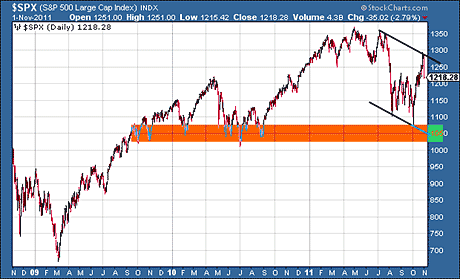What with this week’s horrendous stock market showing so far, I’d love to have some good news to report.
But I’m afraid I don’t.
It looks extremely ugly out there. And I think we’ve got further falls ahead…
October was a fantastic month for markets
It doesn’t feel like it, but October was actually the best month in the stock market since 1974. The S&P 500 was up by more than 200 points at one stage, rising from a trough of 1,075 to a peak of 1,292. In just two days we’ve given back 70 of them.
It’s little wonder markets are so volatile. Nobody seems to know what’s going on. We’ve got political leaders who are saying one thing one day, then u-turning the next, floundering and pandering with no clear strategy but popularity. We have shrinking economies, job losses, real incomes falling, credit contracting, insolvent, undercapitalised banks – huge deflationary forces, in other words.
But we also have quantitative easing (QE), zero interest rates, negative real rates, high and rising prices, and European leaders who have tried to solve the Greek debt crisis with a proposal for more debt and greater leverage – that is to say, huge inflationary forces.
What on earth are you supposed to do?
The sensible, simple thing, should be to stay in cash. But negative real interest rates (ie after adjusting for inflation) have killed that option. Maybe losing 5% a year against inflation isn’t such a bad thing in this market, but it’s not very appealing. So you’re forced to speculate.
But a banking crisis, sovereign debt crisis and a potential global economic unravelling are hardly what you’d call the ideal economic conditions in which to be putting money to work. It is no easy task to navigate all of this and come out with your wealth intact, particularly if you are an investor who likes to hold for more than one week at a time. So what do the charts suggest?
Could the S&P 500 revisit 666?
Looking at a chart of the S&P 500 over the last three years, the orange band marks the area from about 1,030 to 1,080. There is a lot of support in this zone.
 I have also drawn some parallel black lines to show the trend we are now in. The October rally was nothing more than a bear market rally. The larger trend is down. I almost suspect that Greek prime minister, George Papandreou, identified the same trend on his stock charting software, then waited until the S&P 500 had hit the exact top of the range at 1,290, before his announcement that he was to hold a referendum on austerity, which launched this latest cascade in stocks.
I have also drawn some parallel black lines to show the trend we are now in. The October rally was nothing more than a bear market rally. The larger trend is down. I almost suspect that Greek prime minister, George Papandreou, identified the same trend on his stock charting software, then waited until the S&P 500 had hit the exact top of the range at 1,290, before his announcement that he was to hold a referendum on austerity, which launched this latest cascade in stocks.
We might break out of this range to the upside, of course. I hope we do. But I would expect another date with the orange zone and 1,050-1,100 first, perhaps before the end of the year. If we go through that orange zone, I see 950 as an area of support. If that doesn’t hold, I really wouldn’t be surprised to eventually see an encounter with our March 2009 low, the number 666, before this is over. Maybe more QE would prevent that however.
Back in March I said “we’re in a bear market now”, so it was time to sell rallies. Then in the summer I got a confirmed ‘sell’ signal. I see nothing to change any of that. My policy has been – and it’s still the advice I am giving to anyone who asks – to sit on your pot of gold (and cash) and watch it all unravel from the sidelines.
Despite this, like a disgruntled football fan, I feel a certain amount of frustration. My star, wild card striker – my golden junior mining stocks – are not scoring the goals they were signed up to do. So much so that I sometimes feel like sacking them altogether.
And, second, even from my cheap seats somewhere at the back of the stand, I can see what needs to happen on the economic pitch. There’s a bunch of broken crocks out there. It’s obvious they’re finished, so stop pumping them full of steroids and let them limp off. Then we can get some fresh legs on.
What I’m saying is, let those who are bust fail, let’s all take the required hit, then we can start again with a clean sheet. We’ll all be better off in the long run. But this isn’t going to happen. Our leaders are too obsessed with intervention and re-election to let it happen. People expect them to act. If they do something and it doesn’t work, they have to do more, not less.
More and more money is going to be found somehow and thrown down the black hole of southern Europe, and wherever the debt crisis pays its next visit. And, just as they do in Japan, zombies shall walk the earth (my colleague James Ferguson is covering this very topic in the next issue of MoneyWeek magazine, out on Friday.
Category: Market updates

